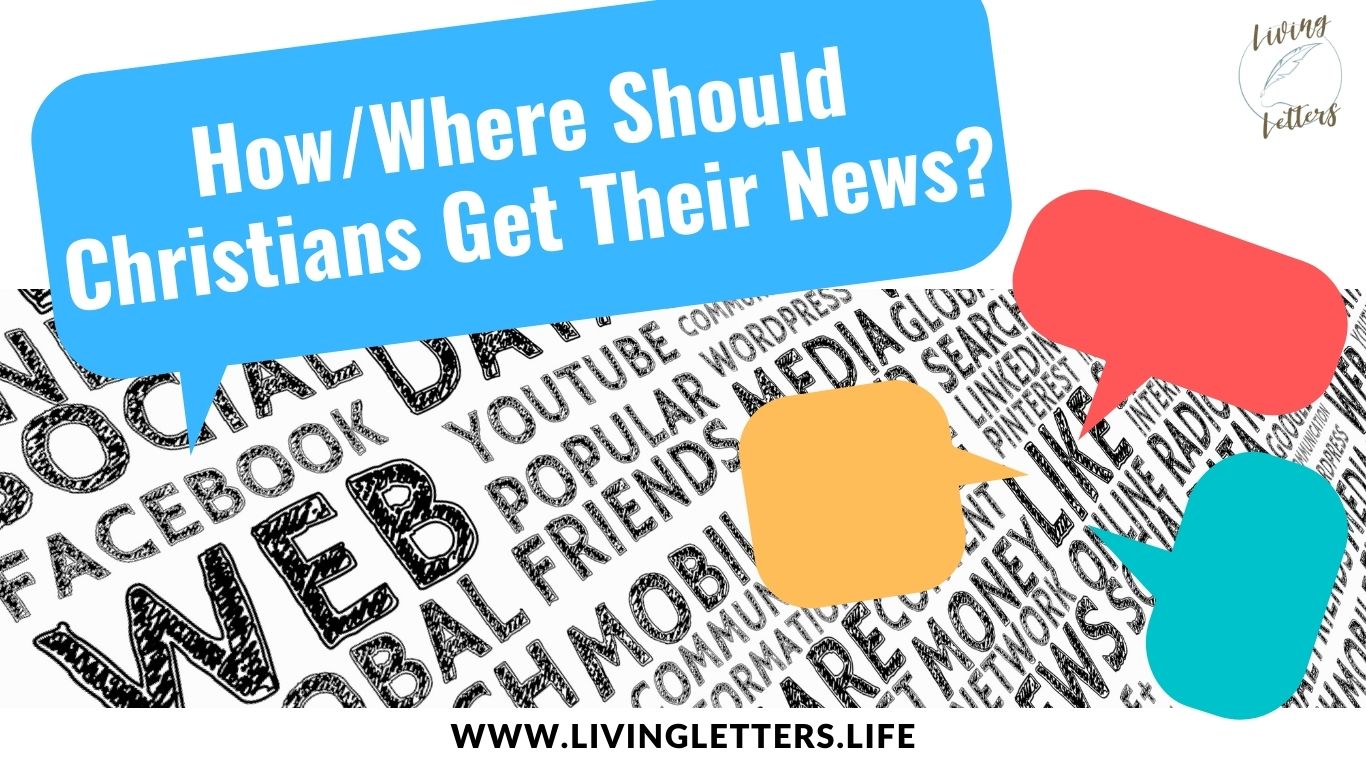
I remember my parents discussing who gave more accurate news reports—NBC's Chet Huntley and David Brinkley or CBS's Walter Cronkite. Back then, the newscasters seemed often to give glimpses of their personal persuasions, but the news stories themselves usually originated with cameras perched in the midst of the news event with little commentary except to say what was already obvious. I remember watching the Viet Nam war, close up, a soldier on the ground in tears because his leg had just been blown off. That picture has never left my mind. The reporter was in tears.
Still, it did and still does matter what stories the media chooses to cover, and the importance they give to each. The big change through the decades of news reporting is that the personal persuasions of every network has become more and more transparent, and stories often are introduced with viewers being told what to think about what they are seeing. A differing viewpoint is not offered.
These and other seemingly misinformed reports leave us wondering what is true and what is not, and have greatly contributed to the divisions on so many levels of the American populace. Who do we believe? Are there any reliable news sources? Our natural tendency is to look for coverage that reinforces what we already believe and want to believe. Notwithstanding, if that is what we do, are we really even interested in hearing what actually is happening? And is anyone truly capable of reporting something without personal bias?
“ These and other seemingly misinformed reports leave us wondering what is true and what is not, and have greatly contributed to the divisions on so many levels of the American populace. ”
You've probably heard how police investigations keep witnesses isolated so that each person tells the story the way they saw and heard it. Because we are not the same person, each witness remembers and interprets the same event a bit differently. When I was studying journalism back in the early 70's, these were some of our classroom conversations. It is close to impossible to report something without some kind of bias and so we were advised to follow the practice of police investigation when we arrived on the scene; or if we were on the scene already, to ask others around us for their take as well as telling ours.
As Christians we must also consider that there's something known as a biblical worldview which can be defined as a view that takes into account what the Bible says, and applies it to what is going on in the world. It may also be called a Christian worldview, because it is “built upon the framework of ideas and beliefs through which a Christian individual or group interprets the world and interacts with the world. The Christian worldview sets forth with finality three areas of existence [I'm going to call these biblical absolutes]: Existence [the Bible tells us that God exists and how the world came to exist and continues to exist], Morals [the Bible gives us commands to live by and defines good and evil, righteousness and unrighteousness], and Knowledge [the Bible educates about who God is, His will, and His purposes]” (Cultivating a Biblical Worldview - Grove Christian School).
How then should a biblical worldview influence news reporting? Put even more articulately, where should Christians go to get factual news? Klaas-Jan Gunnink, writes in an article of Reformation Today that the answer may be to “read widely.” Compare the facts given from many sources, consider the worldview of each source. Ask yourself questions about where the facts are as you compare and contrast. Be a truth-seeking reader.
“ It is close to impossible to report something without some kind of bias. ”
“Reading widely,” writes Gunnink, “counters two other issues: it prevents us from staying in an information bubble, where the perspective is your own. If this happens, you are only confirmed in what you already know, instead of challenged to grow in discernment and understanding of the views of people with a different worldview. And [second], reading widely will also protect you from believing fake news, for real events should have been reported by [many] media as well” (https://reformation-today.org/articles-of-interest/a-christian-approach-to-the-news-media/).
Gunnink suggests that we can see this “reading widely” idea illustrated in the four gospel accounts of the New Testament. “The Holy Spirit has not just inspired multiple men to give us a more complete picture of Jesus' life, but the multiple attestations of these accounts from very early sources provide stronger evidence for the truthfulness of their claims.” And while each gospel affirms the others, each also has its own perspective. We need them all to be fully informed about who Jesus is.
I like to check Christian news sources against secular media, and I check secular media against each other. I like to hear/read about all news. Not just headlining news. A radio station I listen to in my car has a daily morning segment called “Silly News” and indeed, it tells the results of inept criminals who botch their crimes ridiculously and of course, get caught before any harm comes to anyone.
“ Compare the facts given from many sources, consider the worldview of each source. ”
Among Christian news sources, I like World Magazine because it covers quirky news items as well as the leading headlines. It also gives some newsy facts that I probably would never know about if I didn't read it there. Each issue of World also has several columnists offering their perspectives as believers. There are great interviews with a variety of professional interviewees and other articles spotlighting notable people and organizations from around the world. Movies, books, and music are reviewed in each issue as well. Secular and Christian. I have read the magazine almost from its inception in the 90's and trust it as a news source. The magazine comes out twice a month but there is also a volume of daily online material: https://wng.org/.
Christian Broadcasting Network (CBN) has its own news coverage team as one would expect of any network. CBN News (https://www1.cbn.com/cbnnews) is presented at various times throughout their broadcast day but is available online any time. The news reporters are professional and trustworthy and are present at all major news events. However, one cannot miss that this is a Christian news organization, with commentaries and many interviews, news and feature stories that primarily interest only Christians. That is a good thing in the grand scheme of “reading widely” though, as secular media has no interest in news that encourages and builds up the kingdom of God.
In May of 1997, Joseph and Elizabeth Farah began an online news outlet, World News Daily (WND) (https://www.wnd.com/). Its slogan, “A Free Press for a Free People,” sums up the Farah's intentions to bring the news from a very conservative perspective. Although the owners are Christians, this media emphasizes that it is a government watch-dog, “boldly exposing corruption, deception, fraud and abuse wherever and whenever they are found. The pioneering news site also values highlighting and supporting individuals and institutions that demonstrate great virtue and goodness.”
“ While each gospel affirms the others, each also has its own perspective. We need them all to be fully informed about who Jesus is. ”
Another fairly recent Christian news concept is “The Pour Over.” If you are on Instagram, you can follow here: https://www.instagram.com/thepourovernews/?hl=en. If you would like to go to their web page to read the news each day, go here: https://www.thepourover.org/news. Or if you would like to have the news dropped into your email box along with some scripture verses, subscribe here: https://www.thepourover.org/compelled. They say they are just Christians, simply bringing you some daily news stories along with encouraging Bible verses. It's a unique take, though they are not really writing or reporting their news, but sharing the secular media's news stories by providing links throughout their stories. Still, it is a fresh and encouraging presentation—feels like reading the news with a bit of a devotional and Christian comment.
One area in particular, that the secular media never covers adequately, if at all, is how much persecution of Christians is currently occurring all over the world. I appreciate my copies of Voice of the Martyrs magazine, which shares actual testimonies of the persecuted and informs me as to where the persecution is occurring. Without that, I wouldn't even know the extent and number of countries where persecution is happening. I appreciate being able to more adequately pray for Christians all over the world by names I learn in that magazine.
“ Tim Challies: 'There is always one thing we can do. We can pray. Pray for our brothers and sisters all over the world, pray for people in need, for our government, for doctors and nurses....Let us also pray that journalists and editors be strengthened in their dedication to truth and fearless in their quest for it…' ”
Social Media is not the place to gather news sources. However, it is allowing us to receive news especially from our Christian brothers and sisters worldwide. It has been novel for us to be able to receive updates from fellow Christians in the Ukraine these days, and to see the brave Ukraine people as they endure and battle Russian invasion.
This leaves one last question for believers. What should be our response to the news we hear? The Gunnink articles quotes a good answer from Tim Challies: “There is always one thing we can do. We can pray. Pray for our brothers and sisters all over the world, pray for people in need, for our government, for doctors and nurses....Let us also pray that journalists and editors be strengthened in their dedication to truth and fearless in their quest for it…”
Beyond that, being aware of news events should sharpen our desire to become better “good news” bearers to the broken world around us.


Send Me A Message